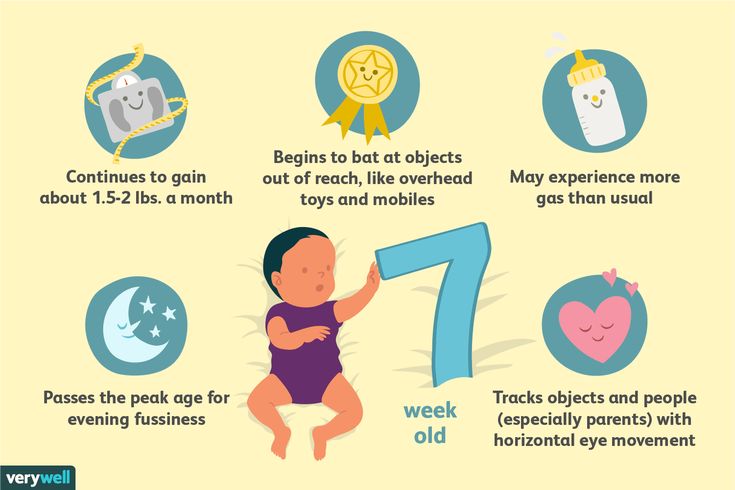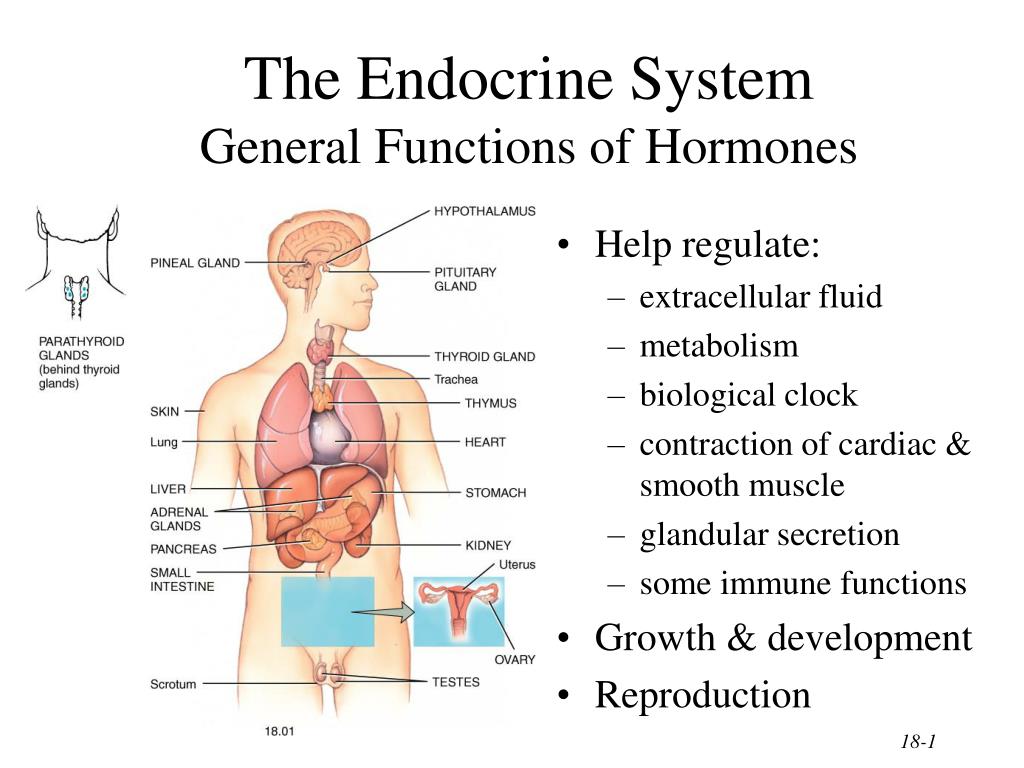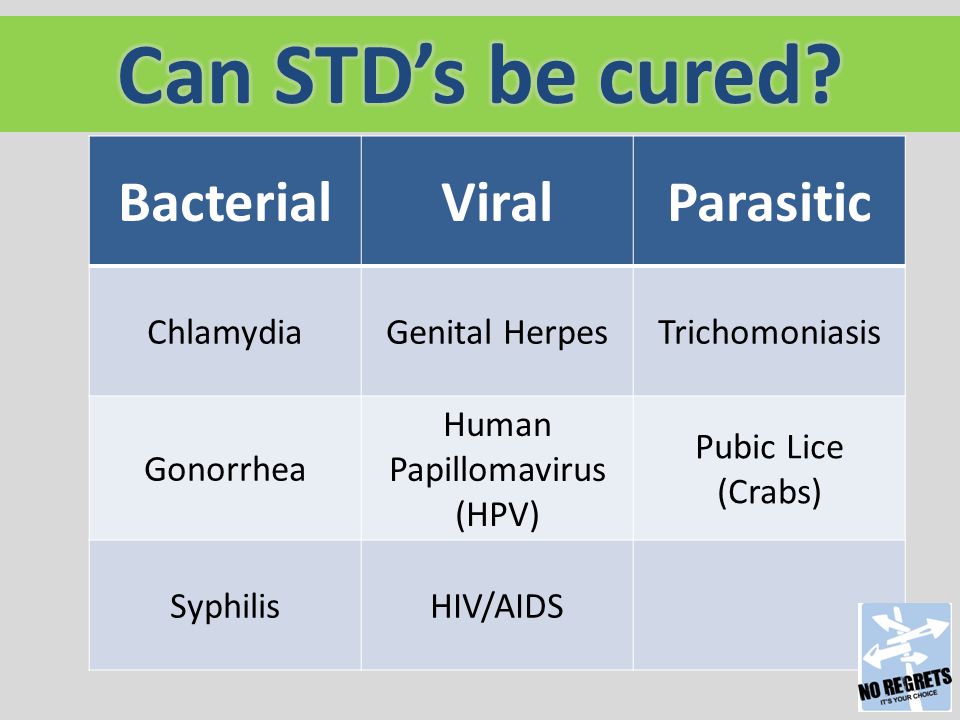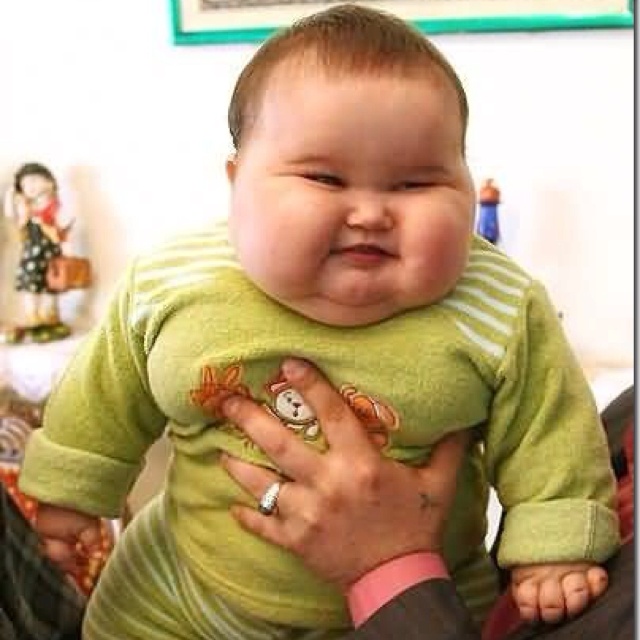Newborn at 2 weeks old
Growth & Development: 2 Weeks
The first two weeks with a new baby requires a lot of adjustments and can be physically exhausting for new parents. Be sure to conserve your energy and rest when your baby sleeps. Let go of less important tasks at this time and accept help from family or friends. By 2 weeks your baby should have regained any initial weight lost.
Development
Two-week-old babies can:
- Be expected to sleep a large portion of the day – about 16 - 20 hours.
- Raise their heads slightly. When your baby is awake, give him or her supervised time on his or her tummy so he or she can develop upper body muscles.
- Focus and begin to make eye contact with you.
- Blink in reaction to bright light.
- Respond to sound and recognize your voice, so be sure and talk to your baby often.
Diet & Feeding
For proper growth and development, breast milk or formula is all your baby needs for the first 4 - 6 months of life. Breast milk is the preferred form of nutrition for infants. However, not all moms are comfortable with this method of feeding or are able to breastfeed. For these babies, formula is an excellent source of nutrition.
Giving solid food, juices or homogenized milk too early can lead to problems including anemia or even obesity. Contrary to popular belief, cereal in the bottle will not make a baby sleep through the night. Most babies will sleep through the night once they weigh between 13 and 15 pounds and are around 4 - 5 months of age.
Amount
About 6 - 8 feedings every 24 hours for formula-fed babies is the norm; more frequent feedings are required for breast-fed babies (usually 8 - 12 within a 24 hour period). Your breast-fed baby will likely nurse 10 - 20 minutes on each breast every 1½ - 3 hours. Average amounts of formula are as follows:
| Ages | Ounces Per Day | Ounces Per Feeding |
| 2 Weeks | 22 | 2-3 |
| 1-2 Months | 28 | 3-4 |
| 3 Months | 32-34 | 4-6 |
For now, a flexible feeding schedule is best.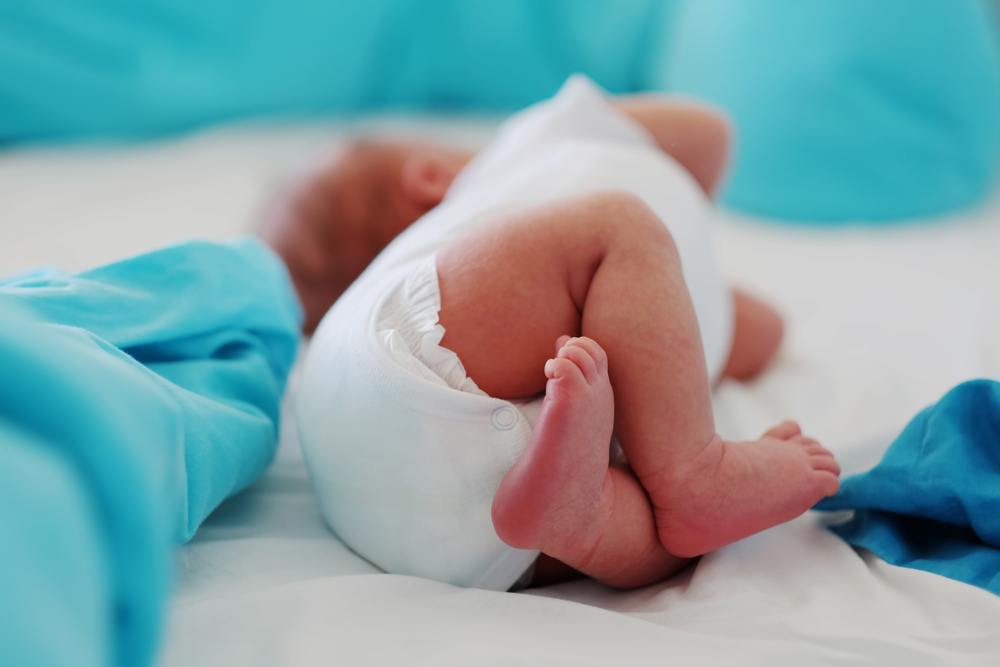 Remember, these are just guidelines. Your baby is able to regulate his or her own intake to meet day-to-day needs.
Remember, these are just guidelines. Your baby is able to regulate his or her own intake to meet day-to-day needs.
Tap water is appropriate to make up baby formula. It does not need to be boiled, if your home is on city water. If you have well water, contact your local health department to ensure safety and fluoride content. Boiling of well water is recommended up to six months of age.
Offering plain tap water to your baby is not necessary since breast milk and formula are over 95 percent water.
Baby formula WITH iron is recommended. With this, no additional vitamins or iron are necessary.
Breastfeeding mothers should continue to take their prenatal vitamins and drink 8 ounces of water, juice or milk per feeding.
Although newborns can normally lose up to 10 percent of their birth weight during the first week of life, they should be back to their birth weight by two weeks of age. Then, over the next few weeks, they generally gain about an ounce per day.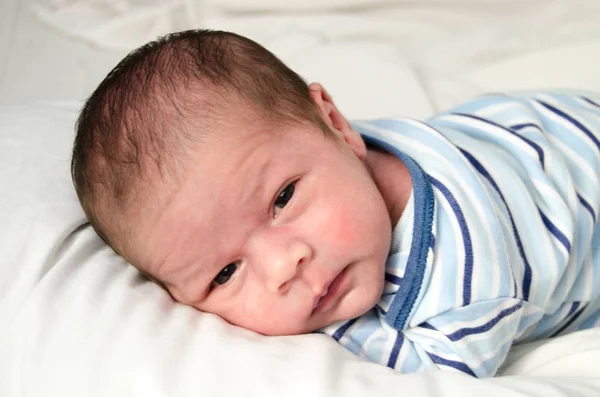
Babies should not be placed flat on their backs while being fed. Hold your baby slightly upright so your baby can see your face. Propping the bottle or laying your baby flat can lead to choking or an increased chance of ear infections. A baby who awakens at night for feedings should be fed and returned promptly to his or her own bed. Do not encourage play during nighttime feedings. Many infants spit up often. If your baby tends to do this, keep his or her head elevated 30 - 45 minutes after each feeding.
Crying & Sleeping
Many infants will average two to three hours of crying per day. This is considered normal. This usually starts after two to three weeks of age, peaks by six weeks of age, and then resolves by two to four months of age.
If your newborn cries, you should pick up your baby. You will not spoil him or her at this age. During the night try and allow your baby to learn to fall asleep on his or her own, after you have ensured that he or she is not hungry, wet or uncomfortable. If you feel that your baby’s crying is excessive, please talk with your doctor.
If you feel that your baby’s crying is excessive, please talk with your doctor.
Babies need to sleep in their own beds. You should also try to put your baby down when he or she is drowsy, but not quite asleep so they can learn from an early age to fall asleep on his or her own. This will help babies avoid having sleeping problems when they are older. However, getting a newborn or young infant to sleep may be challenging. They do require a lot of swaddling and closeness as they transition to the outside world. Biologically, because of their immature sleep cycle, they also tend to be light sleepers. Sleep difficulties should begin to improve after six weeks of age. During these first few months, your baby’s sleep- wake cycle may be confusing and trying. Try to nap when your baby does.
Bowels
Stools should be soft, and range from liquid to pasty. With breastfeeding, a baby’s stools are usually looser than with formula feeding. Seed-like particles in stools are normal. Babies may have small stools after every feeding or might only have one large stool every three to four days. Straining, grunting, and turning red in the face during stooling does not signify constipation as long as the stools are soft. Constipation is defined as hard and infrequent stools. Please talk with your doctor if your baby is having hard, infrequent stools or is not feeding properly.
Babies may have small stools after every feeding or might only have one large stool every three to four days. Straining, grunting, and turning red in the face during stooling does not signify constipation as long as the stools are soft. Constipation is defined as hard and infrequent stools. Please talk with your doctor if your baby is having hard, infrequent stools or is not feeding properly.
Bathing
At first, your baby may or may not enjoy bath time. Pay special attention to your baby’s genitals. Do not force back the foreskin on uncircumcised boys; the foreskin will gradually go back within a few years. Little girls should be wiped from front to back rather than from back to front. Gently spread the outer labia apart to cleanse out stool and secretions.
Medications & Vitamins
Do not give your baby any over-the-counter medications such as Tylenol®, fever drops, ibuprofen, or cough and cold medications. These can be harmful at this age.
The American Academy of Pediatrics recommends that all exclusively breast-fed children receive vitamin D 400 IU per day. Infants who are breast fed should receive supplemental vitamins, such as Enfamil Poly-Vi-Sol®, D-Vi-Sol® or Tri-Vi-Sol (1mL per day) m, by two weeks of age. Formula-fed infants do not need any additional vitamin D.
Infants who are breast fed should receive supplemental vitamins, such as Enfamil Poly-Vi-Sol®, D-Vi-Sol® or Tri-Vi-Sol (1mL per day) m, by two weeks of age. Formula-fed infants do not need any additional vitamin D.
Safety
Suffocation & SIDS Prevention
- Your infant should only sleep on his or her back in the crib, bassinet or cradle.
- Do not let your baby sleep on a pillow, plush blankets, couch or sofa, your bed or waterbed to reduce the risk for SIDS.
- Crib slats should be no farther apart than 2 3/8 inches. There should not be a gap between the mattress and the crib where arms and legs could get caught. Pick a safe location for the crib in the same room where you sleep, preferably away from any heaters.
- Recent research on Sudden Infant Death Syndrome (SIDS) states that the use of pacifiers may reduce the likelihood of SIDS. Do not tie the pacifier on a string around your baby’s neck or use a pacifier holder during sleep.
- Research shows the risk of SIDS has been reduced when the infant sleeps in the same room as a caregiver, but in his or her own bed.

- Learn infant/child cardiopulmonary resuscitation (CPR), which involves management of choking.
Burns
- Never carry your baby and hot liquids or foods at the same time.
- Do not warm your baby’s bottle in a microwave oven. Uneven heating can cause scalding of your baby’s mouth. Formula can be given at room temperature.
- Set your water heater temperature to no more than 120° F to avoid scalding accidents.
- Always check the baby’s bath water before placing your baby in the tub.
- Have a working smoke detector in your home. Change the batteries roughly two times a year.
- Remember most house fires are caused by improperly extinguished cigarettes so do not allow smoking in your home.
Car Injuries
ALWAYS use an approved infant car seat while traveling in an automobile. The safest place for your child is the backseat until 13 years of age. Car safety experts now recommend keeping children rear facing until they are two years of age.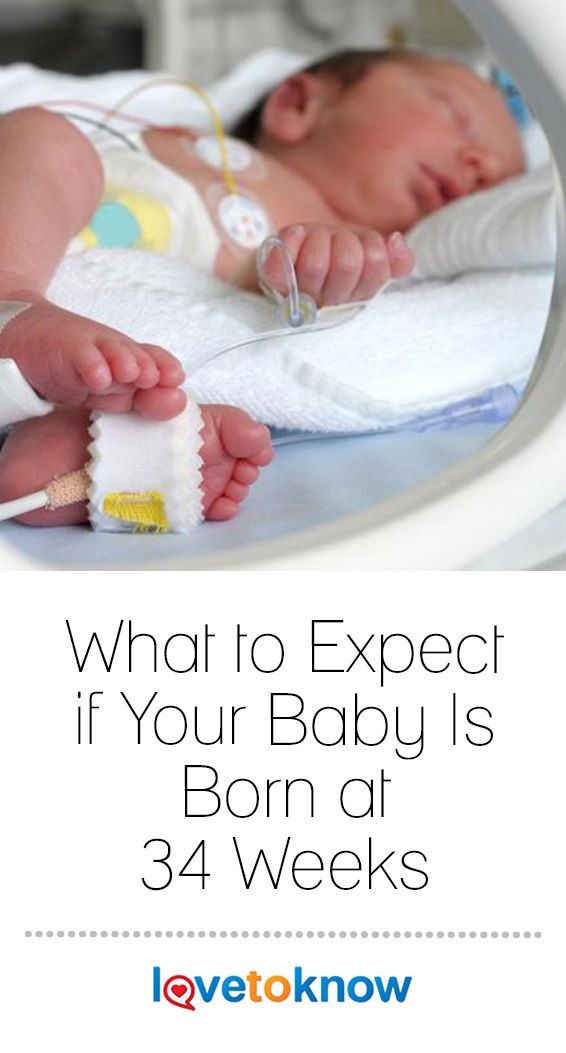 It is okay if their legs are bunched up. It is still the safest way to transport young children. Make certain that your baby’s car safety seat is installed correctly. Read and follow the instructions that come with the car seat and in the owner’s manual of your car. Strongly consider having the installation inspected by local experts.
It is okay if their legs are bunched up. It is still the safest way to transport young children. Make certain that your baby’s car safety seat is installed correctly. Read and follow the instructions that come with the car seat and in the owner’s manual of your car. Strongly consider having the installation inspected by local experts.
Drowning
NEVER leave your baby unattended in a bath, even for a second. Children can drown in two inches of water.
Falls
Always strap your baby in when using the car seat as a carrier. Babies can stretch their legs and may roll from the carrier. Be aware that although two week olds do not usually roll, they can wiggle. Do not leave your baby unattended on a changing table, bed or sofa. If your child has a serious fall or does not act normally after a fall, call your doctor.
Healthy Habits
All household members and direct caregivers of your baby should receive a flu vaccine each October. All children older than six months should receive an annual flu vaccine. Children under nine years of age need a booster shot four weeks after their very first flu vaccine.
Children under nine years of age need a booster shot four weeks after their very first flu vaccine.
- Do not allow smoking in your house or car. Tobacco smoke in a baby’s environment is linked to more frequent ear and respiratory infections and even to SIDS.
- Do not give honey to an infant less than 12 months of age. Honey contains a toxin, which a baby’s digestive tract may not be able to inactivate.
- Since babies, during the first two months of life, do not fight off infection as well, keep your baby away from people with colds, the flu or other contagious illnesses. This could mean not taking your baby out much, especially during the first four to eight weeks of life, unless absolutely necessary.
- Practice good hand washing.
- Breastfeed for up to 12 months of age, if possible.
Next Visit
Your child’s next appointment is at one to two months of age. The vaccine series will begin at two months of age. Please call us if you have any concerns about your child before then.
Two Week Old Milestones | Pediatrics East
Notice of EHR Vendor Data Security Incident
- Pay Your Bill
- Appointments
- Patient Portal
Socials
Search
Enter your search term and press enter.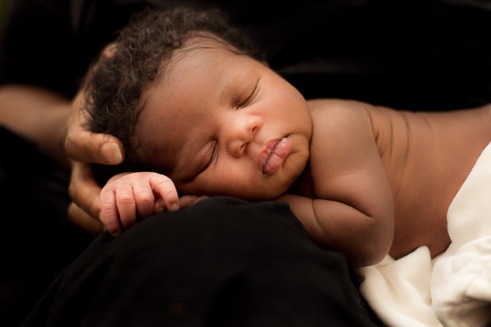 Press X to close.
Press X to close.
Click here to access a printable PDF.
Okay, the honeymoon (if you had one) is over now. Your baby has certainly decided by now that it is fun to eat and likes to do so. He/she has also probably decided that crying is fun too. Although the hard work has begun, try to relax, you will survive.
Is this normal?
No, your baby does not need lotion for that dry skin on feet and hands. It is simply result of 9 months of swimming and will fall off. Lotion could do harm (if baby has sensitive skin).
And no, those noises from his/her nose do not mean the baby is allergic to anything. Very small nasal passageways make lots of funny noises when normal, small amounts of phlegm are present.
Feeding Baby At Two Weeks Old
Feedings should occur every 2-3 hours and hopefully every 4-5 during the night. Feeding should take about 30 minutes.
If bottle feeding, a ballpark amount is 3-4 ounces. However, remember Shaquille O'Neil and Olympic gymnasts were once babies and certainly ate differently (this does not imply that overfeeding your baby leads to a multimillion dollar sports career). If your baby differs from this greatly, we should discuss.
However, remember Shaquille O'Neil and Olympic gymnasts were once babies and certainly ate differently (this does not imply that overfeeding your baby leads to a multimillion dollar sports career). If your baby differs from this greatly, we should discuss.
Babies will happily eat small amounts very frequently but this serves no one’s best interest. It is certain to exhaust a breastfeeding mom and therefore decrease the quality of the milk. Just because your baby cries and roots and sucks does not always mean he/she is hungry.
Use common sense, the clock, and trial and error. If it seems too soon to be hungry it probably is. Try stalling, changing diaper, putting down, holding, pacing, etc. You’ll often be surprised to see that the baby calms down for a while.
If not, try feeding. If it doesn’t work or if baby only takes a small amount, then they weren’t hungry. Allowing a baby that doesn’t know what he/she wants to overstuff with milk will certainly cause puking or a tummy ache. If you want to give that breastfeeding baby a bottle in the evening, go for it. It will give mom a break, let dad in loop and provide ease when you escape from parenthood occasionally.
If you want to give that breastfeeding baby a bottle in the evening, go for it. It will give mom a break, let dad in loop and provide ease when you escape from parenthood occasionally.
I advise against giving water. It is unnecessary and if too much is given can cause major problems such as seizures.
Two Week Old Babies and Gas
News flash…your mom, your spouse, your pet, your boss, and even your perfect little offspring pass gas. Frequently, and it usually stinks. If it is done with a smile (I’m talking about your offspring, not your spouse, here) or with brief discomfort, don’t you dare worry about it. If it is done with a lot of crying and such it probably has more to do with your baby’s temperament than stomach. “Gas drops” are not terribly helpful, but harmless.
Sleeping for Two Week Old Baby
To get good uninterrupted sleep, you will need to wait until your child is 18 or your parents can take the baby to their house. No, it won’t be that bad.
Most babies sleep through the night by 3 months of age; that is not that far off. To help get there start establishing good habits now. Put that baby in a basinet or a crib to sleep. PUT HIM ON HIS BACK TO SLEEP!! You need to put that baby down awake so he/she can learn to fall asleep on his/her own. Mommy and daddy’s chest are cozy for a baby but when baby realizes its not there you’re in for an awakening regardless of hunger.
To help get there start establishing good habits now. Put that baby in a basinet or a crib to sleep. PUT HIM ON HIS BACK TO SLEEP!! You need to put that baby down awake so he/she can learn to fall asleep on his/her own. Mommy and daddy’s chest are cozy for a baby but when baby realizes its not there you’re in for an awakening regardless of hunger.
Let the baby sleep in your bed at your own risk. This practice is common is some cultures. However, those cultures continue it until children are grown. If your goal is different, I suggest you don’t start this habit.
Baby With Fever
If your baby has a rectal temp of 100.4 or greater we need to see baby. Usually result will be hospitalization and tests to screen for serious infection. For this reason, it is our hope that your baby does not encounter any virus until after 8 weeks of age when this rule doesn’t apply.
In the meantime, home is the safest place for the baby. When you need to get out, avoid crowds and well wishers.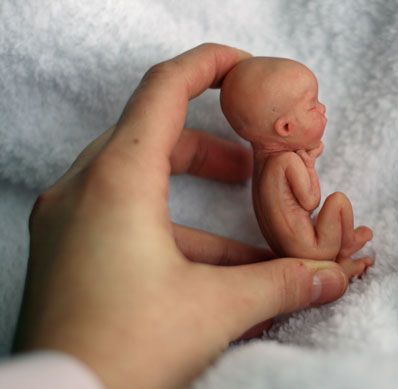 Ask visitor’s to wash hands. Those who are ill, especially children, even with “just a cold” should stay away.
Ask visitor’s to wash hands. Those who are ill, especially children, even with “just a cold” should stay away.
Only check your baby’s temperature if you suspect something is wrong or baby feels real hot. Transient low grade fevers (99-100) can occur from over-bundling and a really good crying fit.
Spitting Up
Some is normal, but if it is projectile and frequent, or baby is real fussy let us check it out. An occasional large episode is fine.
What To Expect
More of the same. Overall, better if patterns can get established. Baby isn’t real interactive at this point, which makes this stage a lot of work without a lot of fun. Hang in there, more fun ahead.
The two-month check up which will include those important immunizations, diphtheria, pertussis, tetanus, pneumococcus (causes meningitis), Hib(ditto), polio, hep. B and Rotavirus.
Parents Know Best
You are the parents. That means you are in charge. Take control. Advice from others, including books, are only options.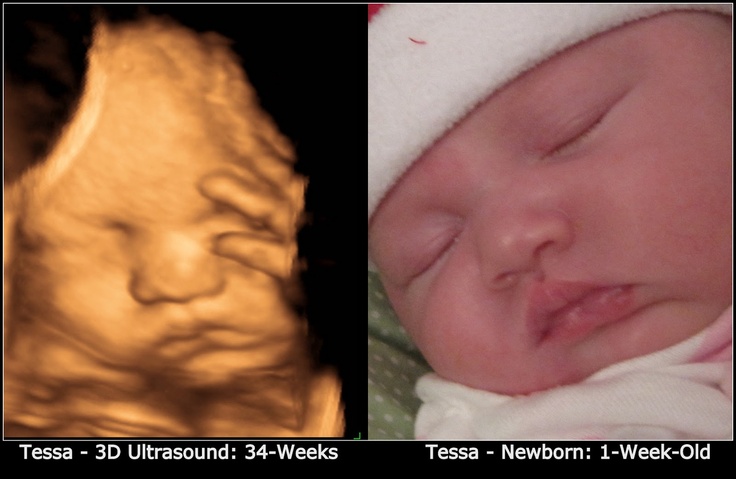 Common sense will dictate. Do what feels right to you, and sometimes what doesn’t if you know it is for the best.
Common sense will dictate. Do what feels right to you, and sometimes what doesn’t if you know it is for the best.
Baby 2 weeks old: baby development, what a newborn should be able to do
What a baby can do at 2 weeks
What he sees
Mother's smell
Revitalization complex
Tone: what to pay attention to
Baby hygiene
Washing
Taking care of the umbilical wound First walks
How does the baby behave in the first weeks of life, and how to care for him according to his needs? These questions concern any new mother, whose days are now inevitably full of unknown anxieties and worries.
The development of a newborn is rapid. Already at 2 weeks, the child can already fix his gaze for a short time. The baby also reacts to the voice of an adult: it changes the nature of crying when it hears the speech of mom or dad. Lying on his stomach, he tries to briefly raise his head and try to keep it in that position. He also has his first smile!
He also has his first smile!
Together with the pediatrician Maria Yurievna Koroleva, we will learn more about his skills, and at the same time we will understand what kind of care he needs now.
It turns out a lot! For example, in order to make it easier for a baby to start a life journey, nature has rewarded him with innate reflexes.
The first cry, the first sneeze, sucking on the mother's breast - all this the baby does reflexively.
The presence and severity of unconditioned congenital reflexes is the most important indicator of a baby's health.
With the sucking reflex, everything is probably clear. But there is also, for example, a search engine! Try to touch the corner of the child's mouth with your finger: and you will see how he actively begins to look for his mother's breast. There are other important reflexes of the newborn, aimed at the survival of the baby in the external environment. For example, a defensive reflex. Put the baby on his tummy and he will immediately "automatically" turn his head to one side.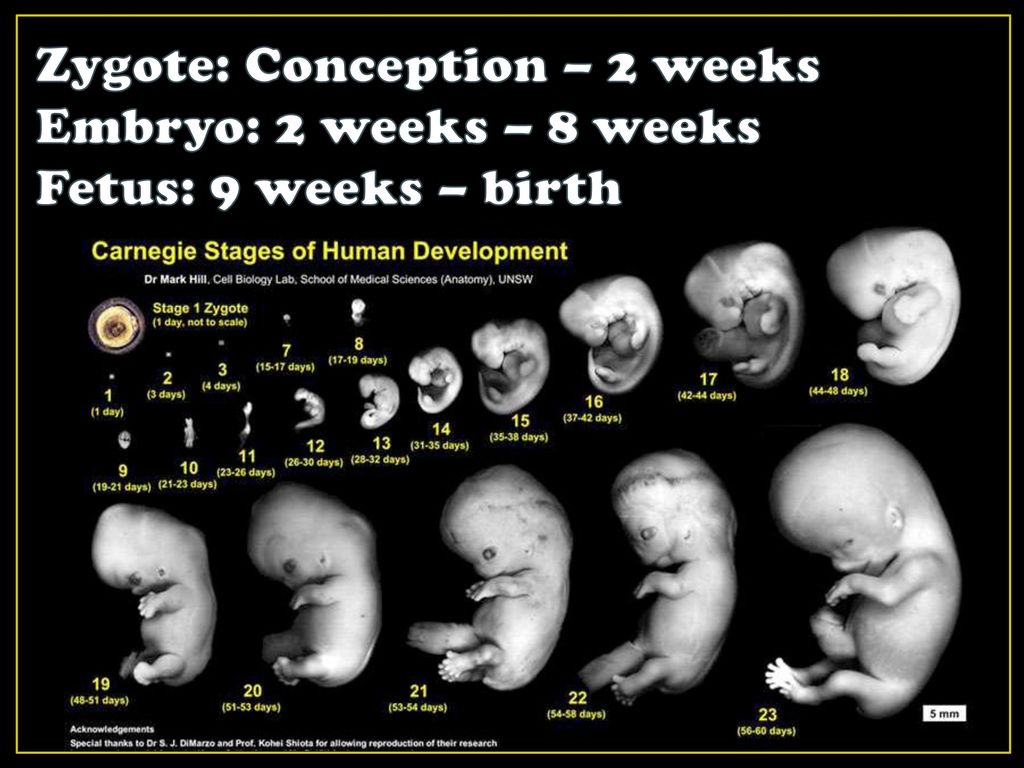 So he can breathe freely.
So he can breathe freely.
Whatever you put into a small palm, the baby clenches his fingers into a fist. This is how the grasp reflex works. Everything is clear here - it is vitally important for the baby to grab hold of mom more tightly.
Adults receive 80% of information about the world through their eyesight. But in a baby, the eyes do not immediately begin to work in full force.
In the first weeks of life, children respond better to contrasting black and white images. For a newborn, the whole world is seen blurry, like a play of light and shadow. That is why, say, such a popular toy as a mobile is too early to hang over the crib during this period. The best object for study during this period is the mother's face, which the baby seems to be trying to capture, carefully studying in the moments of wakefulness.
Don't miss
-
Don't miss
How to understand a newborn baby and what to do so that he does not cry
In the first weeks of life, the sense of smell also plays a leading role in the baby's impressions.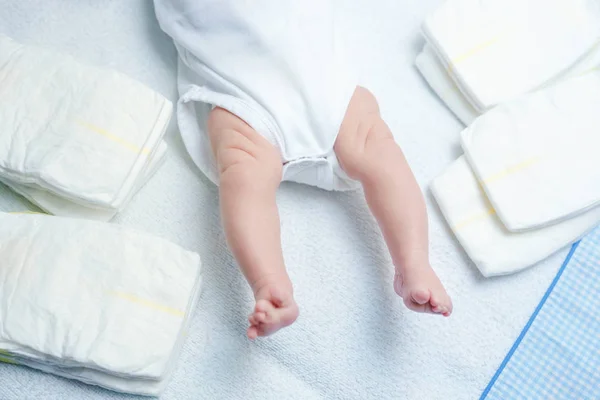
Even without seeing the mother, but feeling her presence, the baby calms down. Provided, of course, that he is dry and not hungry. Knowing this life hack, by the way, allows newly-made mothers to leave home for a while, leaving their home T-shirt or bathrobe in the cradle. The baby, feeling the smell of mom nearby, will behave much calmer.
An important milestone in growing up. More often it manifests itself closer to a month or even a little later. But some newborns can “boast” of them already at the age of just over two weeks old. The "revitalization complex" is manifested by a smile to the mother, joyful movements of the arms and legs to address the baby and a general positive mood background. The appearance of a “revitalization complex” indicates the successful completion of the period of postpartum adaptation of the baby and the active establishment of relations with the outside world.
Is the little one stiff and inactive? The arms are bent and crossed on the chest, the fists are clenched, and the thumbs are covered on top by the other four? Legs all the time pulled up to the tummy? It looks like his muscles are too tight. The same is also evidenced by the fact that the child almost from birth holds his head, while normally this skill appears only at 2-3 months. Alas, this does not mean that a child prodigy is growing in the family: the tone of the occipital muscles is simply too high.
The same is also evidenced by the fact that the child almost from birth holds his head, while normally this skill appears only at 2-3 months. Alas, this does not mean that a child prodigy is growing in the family: the tone of the occipital muscles is simply too high.
A set of exercises will help to relax tense muscles, but they can be performed only after consulting a pediatrician. There are no universal babies!
The eyelids of a sleeping baby are not tightly closed, a narrow strip of protein peeps through them, and the eyes themselves seem to “roll up” - turn up and inward. The sight of these unblinking eyes worries mothers to the extreme. Don't worry - this is normal for a newborn if they are otherwise healthy. Just at the beginning of sleep, the tone of the muscles that lift the eyelids rises slightly: by the year the nervous system will learn to regulate it, and everything will pass. But if the baby has neurological problems, tell the neurologist about this symptom.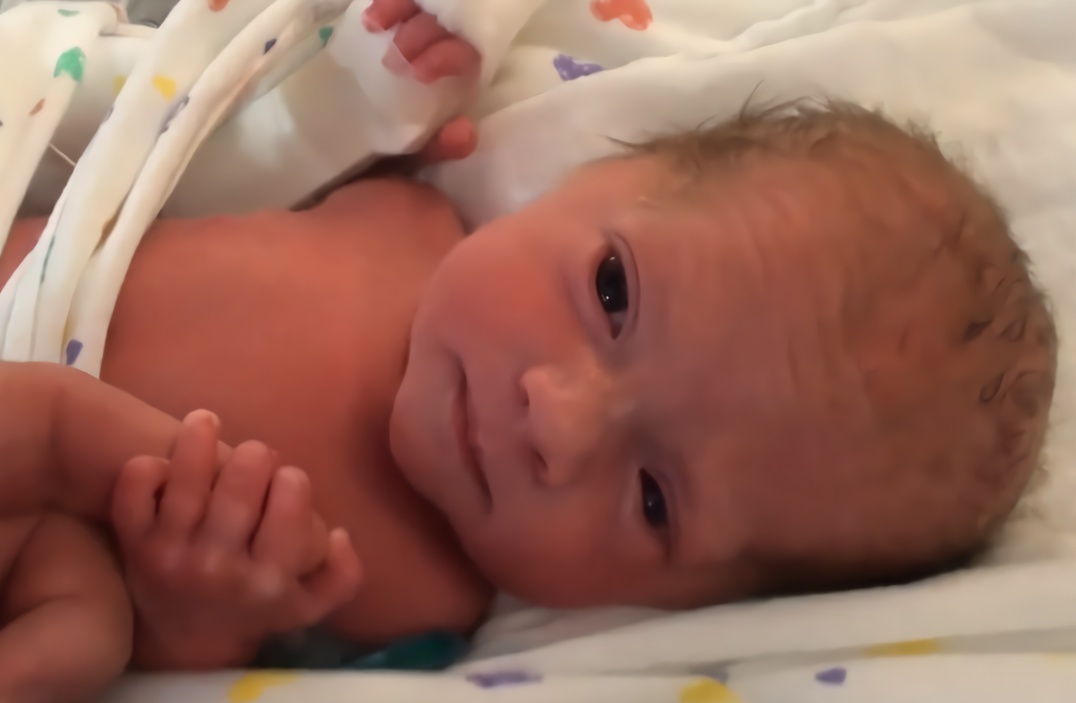
Even a baby does not need a special baby bath.
It is only necessary in certain cases:
- if the old bathroom has a damaged finish;
- if there are pets at home and you wash them in the bathroom;
- if there is no bathroom at home, but only a shower cabin.
In other cases, the newborn can be safely bathed in an adult bath.
When handling it, it is convenient to use a special slide in the bathroom. In this case, the hands remain free, and you do not need to hold the baby.
If your baby's skin is flaky, you can add bath oil to the water.
Don't miss it
The main thing in washing a girl of any age is to prevent stool from getting on the genitals. To do this, always wash it from front to back. It is convenient to wash a small child over the sink. To do this, the girl needs to be held with one hand, and with the other hand, wash off the stool from the genitals and buttocks and lather them with soap or gel.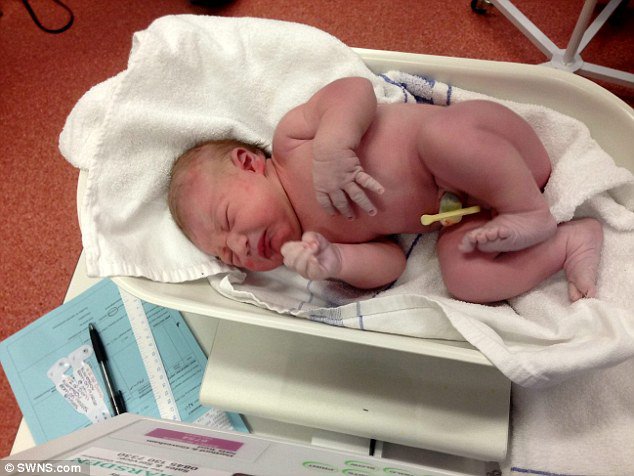 Holding the baby on one arm, you can bring the baby under running water and thoroughly wash off the soap residue from the genitals.
Holding the baby on one arm, you can bring the baby under running water and thoroughly wash off the soap residue from the genitals.
A little boy can be washed over the sink just like a girl, but he can lie on your arm with his back up.
After an evening bath, we treat the girl's genitals every day. To do this, we need peach oil and a cotton pad. We apply peach oil, and with a cotton pad we push the genitals as far as possible and pass them between the labia. A newborn girl may have a white coating on her vulva. This is the original lubricant, and there is no need to clean it up. It is enough to spend one or two times with a cotton pad on the genitals, and gradually the plaque will go away. It is also necessary to treat a girl with peach oil after bathing for the prevention of synechia - fusion of the labia minora.
After washing the buttocks, large inguinal folds and intergluteal folds, a diaper cream is applied liberally. Cal in newborns has a high enzymatic activity.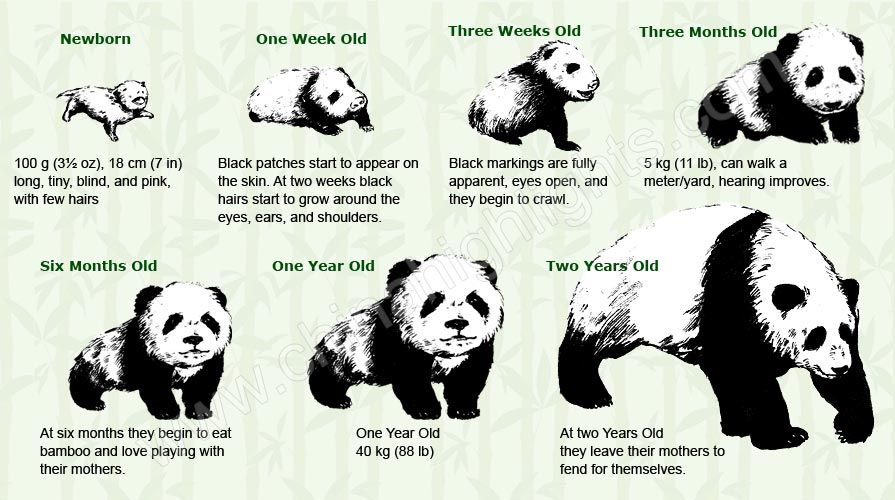 The cream forms a kind of layer between the feces and the skin, protecting delicate skin from irritation.
The cream forms a kind of layer between the feces and the skin, protecting delicate skin from irritation.
The baby's navel often causes the most anxiety for new parents. The stump of the umbilical cord, as a rule, lasts for about a week or even longer, gradually drying up until it falls off. Treat the umbilical wound with a 3% hydrogen peroxide solution (it is convenient to use a pipette for this purpose). Then dry it thoroughly, removing all the crusts with cotton swabs, and lubricate with a 1% solution of brilliant green.
In most cases, the belly button heals without any problems, but if you notice significant redness or swelling around the stump, or if the wound has not healed after 3 weeks after the birth of the child, consult a doctor immediately.
Surely you have already acquired a beautiful, comfortable and maneuverable stroller, and now you can't wait to test drive it. Do not rush to go on long "spree" with the newborn. The duration of the first walks with the baby should not be long. Especially if the child was born in the cold season. Start mode walks from 15 minutes, gradually increasing the time spent in the fresh air up to 1.5 - 2 hours. If the temperature outside is below 5 degrees, then it is better to refrain from walking. The heroic deeds of mothers who pull the stroller in the snow, and in the rain, and in the hail and in the hurricane wind do not justify themselves. In bad weather, if there is a balcony, the baby can walk there at least the entire daytime sleep without any remorse.
Especially if the child was born in the cold season. Start mode walks from 15 minutes, gradually increasing the time spent in the fresh air up to 1.5 - 2 hours. If the temperature outside is below 5 degrees, then it is better to refrain from walking. The heroic deeds of mothers who pull the stroller in the snow, and in the rain, and in the hail and in the hurricane wind do not justify themselves. In bad weather, if there is a balcony, the baby can walk there at least the entire daytime sleep without any remorse.
The first days you spend with your newborn will be remembered forever. You will start a new life full of wonderful discoveries. Agree, who else knows how to properly take care of a child, if not his own mother. She intuitively feels most of his needs, polishing her experience every day.
Keep a diary in which you will write down what you remember these days. After all, the neonatal period is so short, and babies grow so fast!
Sources and literature:
1. WHO: Newborn care at birth
WHO: Newborn care at birth
2. WHO: Newborns, infants
3. Features of the course and prevention of diaper dermatitis in newborns and infants
4. Union of Pediatricians of Russia. Information for parents
Expert
Maria Koroleva
Pediatrician @doctor_koroleva
What impression did this article make on you?
The first month of a child's life - development, care and nutrition in the first month of a child's life
When caring for a child in the first month of life, parents have many questions and worries, which in most cases are caused by the natural features of the baby's development. Anxiety is a normal condition for mother and father, as caring for the health of the newborn becomes a priority for them. But in order to be able to notice in time the signs of problems with the health or development of a child in the first month of life, one should know which particular features of the formation of his body are normal and natural.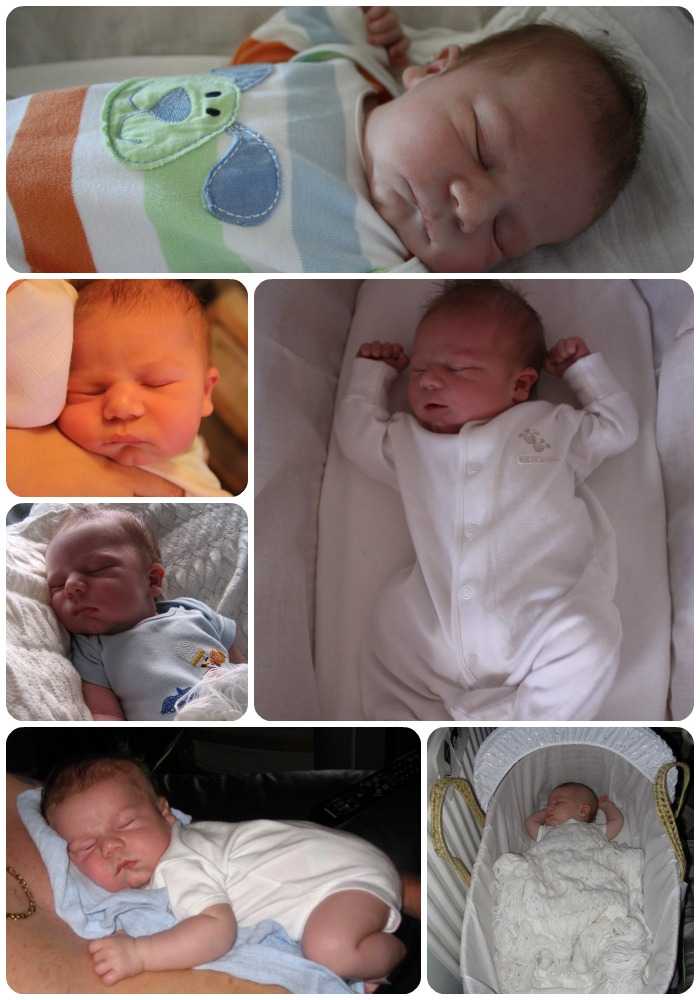
Baby's sense organs in the first month of life
The most important sense organs for a baby are sight and hearing. And we are talking not only about the ability of a newborn to contact the outside world through sounds and visuals. The external environment, affecting the hearing and vision of the baby, stimulates his mental and physical development. In the first month of a child's life, all the sense organs differ in more or less pronounced features.
- Taste. Taste buds in a newborn are well developed, and he identifies the main "irritants" in the same way as an adult. For example, when sweetened water gets on the tongue, the child does not show any special reactions. And when sour apple or lemon juice is added to the water, the baby may show signs of displeasure - frown, try to push out the unpleasant-tasting liquid with his tongue.
- Smell. The ability to identify smells plays an important role in the life of a newborn, especially in the first days and weeks of life, when the rest of the senses are still undeveloped.
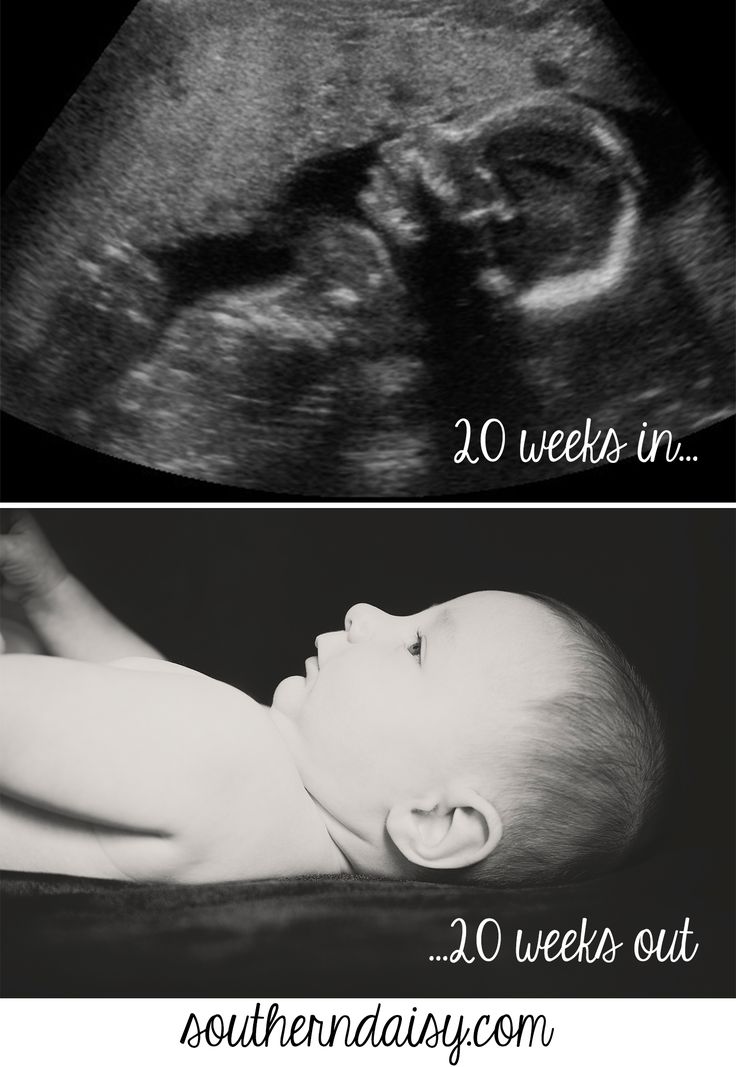 It is thanks to the sense of smell that the child recognizes the mother, unmistakably finds the breast, refuses to feed if he feels an unpleasant odor (for example, if the mother treated the nipple with an ointment to heal cracks or an antiseptic with a medicinal smell).
It is thanks to the sense of smell that the child recognizes the mother, unmistakably finds the breast, refuses to feed if he feels an unpleasant odor (for example, if the mother treated the nipple with an ointment to heal cracks or an antiseptic with a medicinal smell). - Touch. The skin of a newborn is very sensitive to the effects of mechanical and thermal stimuli, but the number of receptors is unevenly distributed. So, the child reacts more actively to touching the palms, feet, face and not so pronounced - when stroking the back and abdomen. In addition, the ambient temperature also causes certain reactions. At an uncomfortable temperature, the child shows signs of anxiety, becomes lethargic, his skin turns pale or red, etc.
- Vision. In the first weeks of life, the child's vision is not sharp. Although a newborn squints in bright light, and his pupils dilate and constrict depending on the intensity of the light, these are reflex reactions controlled by the nervous system.
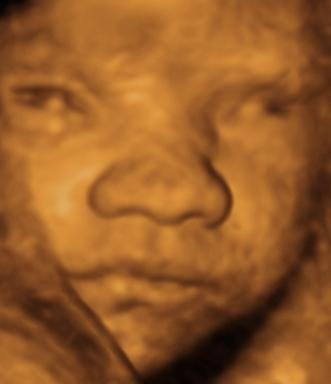 In fact, the images in the field of view of the newborn look blurry and indistinct, and the baby will be able to determine a specific object only 10–12 days after birth. But even in this case, he still does not know how to fix the object with his eyes - the baby will only be able to follow the movement of the object or the light source. Another feature of the vision of a newborn is the mismatched movement of the eyes when they are directed in different directions. This is often a concern for parents who suspect that the child has strabismus. But such a “wandering” look is a natural phenomenon, and by the end of the first month after birth (normally after 4–8 weeks), the baby’s eye movements become consistent.
In fact, the images in the field of view of the newborn look blurry and indistinct, and the baby will be able to determine a specific object only 10–12 days after birth. But even in this case, he still does not know how to fix the object with his eyes - the baby will only be able to follow the movement of the object or the light source. Another feature of the vision of a newborn is the mismatched movement of the eyes when they are directed in different directions. This is often a concern for parents who suspect that the child has strabismus. But such a “wandering” look is a natural phenomenon, and by the end of the first month after birth (normally after 4–8 weeks), the baby’s eye movements become consistent. - Rumor. Hearing is another common concern for parents who do not observe a pronounced reaction in a newborn baby to sounds. But the baby's hearing is already "trained" during fetal development, during which he perceived background noises and managed to get used to them.
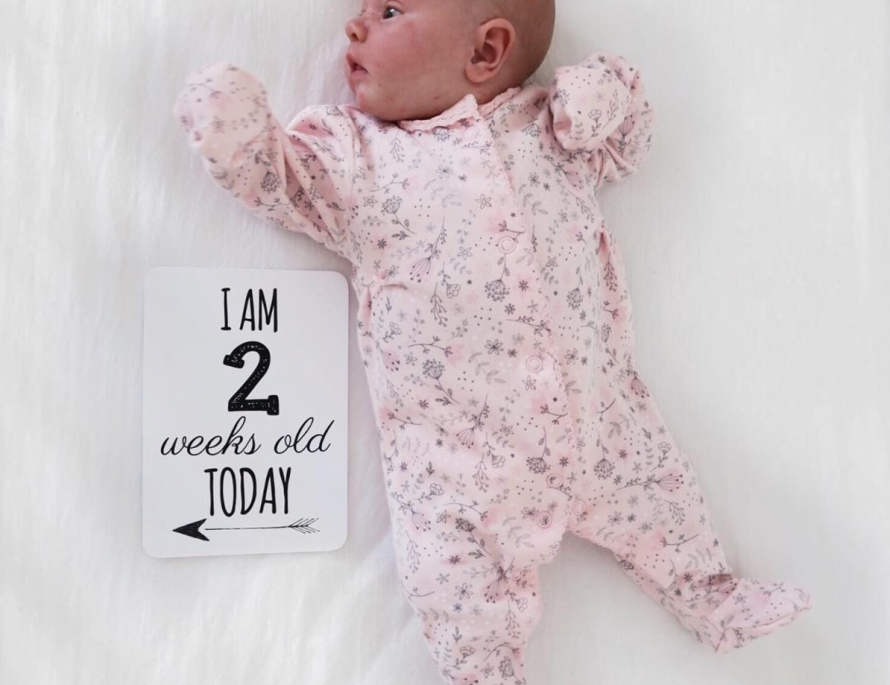 Due to this, in the first months after birth, external sounds rarely cause pronounced reactions in the baby. In addition, the auditory nerve in newborns is underdeveloped, and the child does not yet perceive the “adult” spectrum of acoustic waves: he hears higher sounds better, lower sounds worse.
Due to this, in the first months after birth, external sounds rarely cause pronounced reactions in the baby. In addition, the auditory nerve in newborns is underdeveloped, and the child does not yet perceive the “adult” spectrum of acoustic waves: he hears higher sounds better, lower sounds worse.
Features of physical development
In the first week of a baby’s life, you should not expect any special “achievements” from him: the birth process takes a lot of effort not only from the mother, but also from the child, so sleep and nutrition are the only thing he needs most. But already from the second week, the development of the newborn becomes quite active. Every day he “grows up” and it looks something like this:
- once a day, and the rest of the time he takes a dream. By the end of the first month, wake periods can be 15–30 minutes during each sleep-feeding cycle.
- The baby will learn to hold his head a little later - he will confidently raise his head together with the shoulder girdle at 3-4 months.
 But by the end of the first month, he makes attempts to "control the situation" - turns his face to the side in bright light or moves back if he does not want to take the breast or nipple. If a 2-3-week-old baby is laid on his stomach, then he is already trying to raise his head, reacting to the sounds of his mother's voice or stroking his cheek.
But by the end of the first month, he makes attempts to "control the situation" - turns his face to the side in bright light or moves back if he does not want to take the breast or nipple. If a 2-3-week-old baby is laid on his stomach, then he is already trying to raise his head, reacting to the sounds of his mother's voice or stroking his cheek. - The baby gains an average of 3-4 cm in height and about 700 g in weight during the first month. But these values are very approximate. The range of weight gain varies from 400 to 1300 g and is determined by the weight of the child at birth, the characteristics of childbirth, the quality of the mother's breast milk, the health of the baby, and many other factors.
Fundamentals of hygiene in the first month of life
During the first month after birth, the baby is quite vulnerable to infections present in the environment. The mucous membranes of the respiratory tract and gastrointestinal tract of the newborn, which subsequently acquire their own microflora, remain sterile in the first days and are gradually populated with the necessary microorganisms.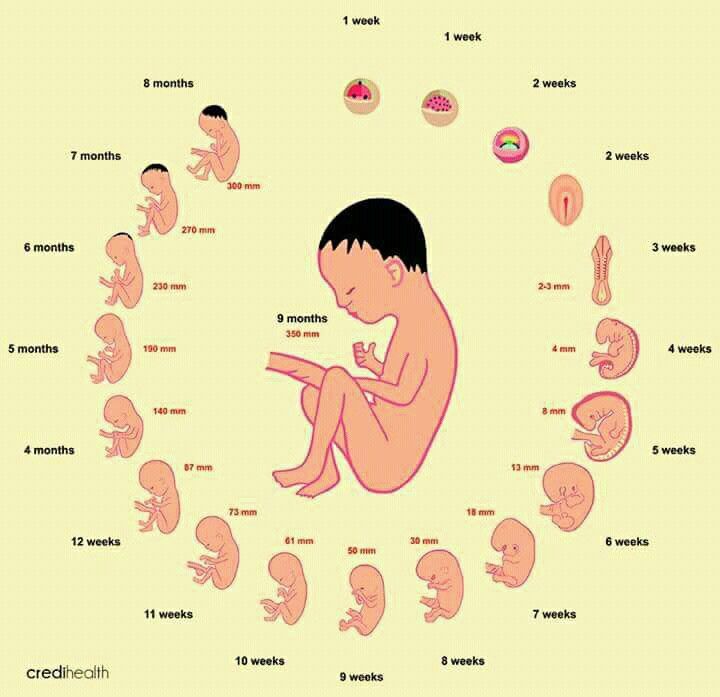 When the microflora is finally formed, the child will be protected from many health disorders in a natural way. But before that, special attention should be paid to caring for him.
When the microflora is finally formed, the child will be protected from many health disorders in a natural way. But before that, special attention should be paid to caring for him.
Food hygiene. Nutrition is the most important factor for a baby during the first months of life. It is he who sets the correct pace of growth and development of the baby and allows the gastrointestinal tract to acquire its own healthy microflora. But in order to reduce the likelihood of pathogens entering the body of a newborn, some hygiene rules should be observed:
- When breastfeeding, the mother should clean the nipples and areolas with water and baby soap before feeding, then thoroughly rinse the breast with clean water and wipe it dry with a napkin.
- For artificial or mixed feeding, it is obligatory to treat all feeding accessories with boiling or a special steam sterilizer. Dilution of the mixture to the desired consistency should be carried out only with boiled water, cooled to a temperature of 36-37 ° C.
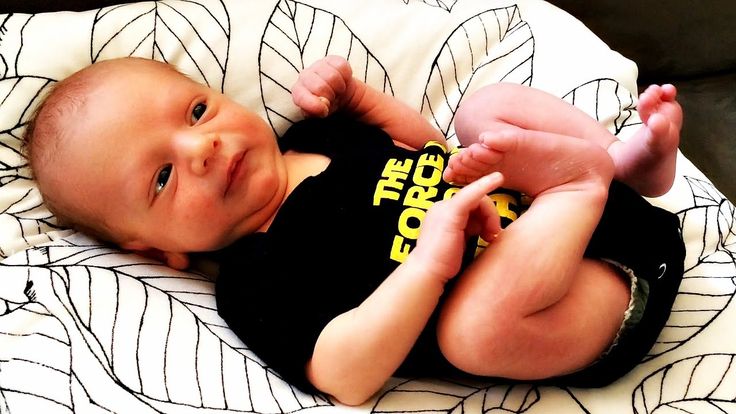
- Since in the first weeks and months after birth, a newborn is likely to develop oral candidiasis (the so-called thrush), the pediatrician may recommend giving the baby a few drops of water after feeding. This allows you to wash off the remnants of breast milk or mixture from the oral mucosa, which are a breeding ground for the fungus.
Personal hygiene
- Baby's skin, especially in the first months of life, is very sensitive to any irritants. Therefore, for bathing a newborn, you should choose products designed specifically for caring for children's skin. Such soap, shampoo or bathing gel does not include substances that can provoke allergies, and their pH corresponds to the pH of the baby's skin.
- The temperature of bathing water should be between 33-34°C in the first weeks, after which, when the child is already accustomed to water procedures, it can be gradually reduced (no more than 1°C per week), bringing to room temperature.
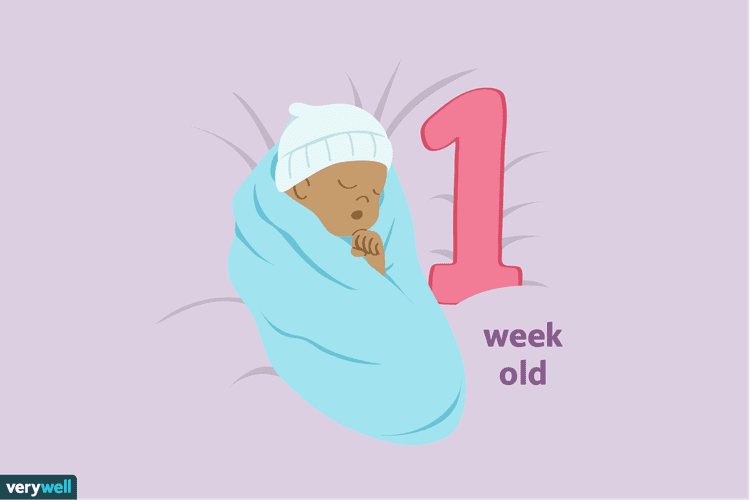 This helps to stimulate the baby's muscle tone, improve blood circulation in the superficial vessels and, in general, harden the newborn. But lowering the temperature of the bathing water should be carried out only after consulting a pediatrician, since hardening procedures for a weakened, premature or child who has had any disease are unacceptable.
This helps to stimulate the baby's muscle tone, improve blood circulation in the superficial vessels and, in general, harden the newborn. But lowering the temperature of the bathing water should be carried out only after consulting a pediatrician, since hardening procedures for a weakened, premature or child who has had any disease are unacceptable. - When changing a diaper, clean the vulva and the skin in the groin and gluteal folds of the child every time with special alcohol-free sanitary napkins. In the first weeks of a baby's life, the feces are mostly liquid or mushy, so after defecation, it is better to wash the child under running water, laying him face down on his forearm, or use special baths for washing. After bathing, the child's skin should be dried with a soft towel that absorbs moisture well, after which 5–10 minutes can be allocated for air baths.
Creating the right microclimate. In the first weeks of life, the baby's thermoregulation mechanisms are not sufficiently developed - his body is still unable to fully compensate for too high or low ambient temperatures.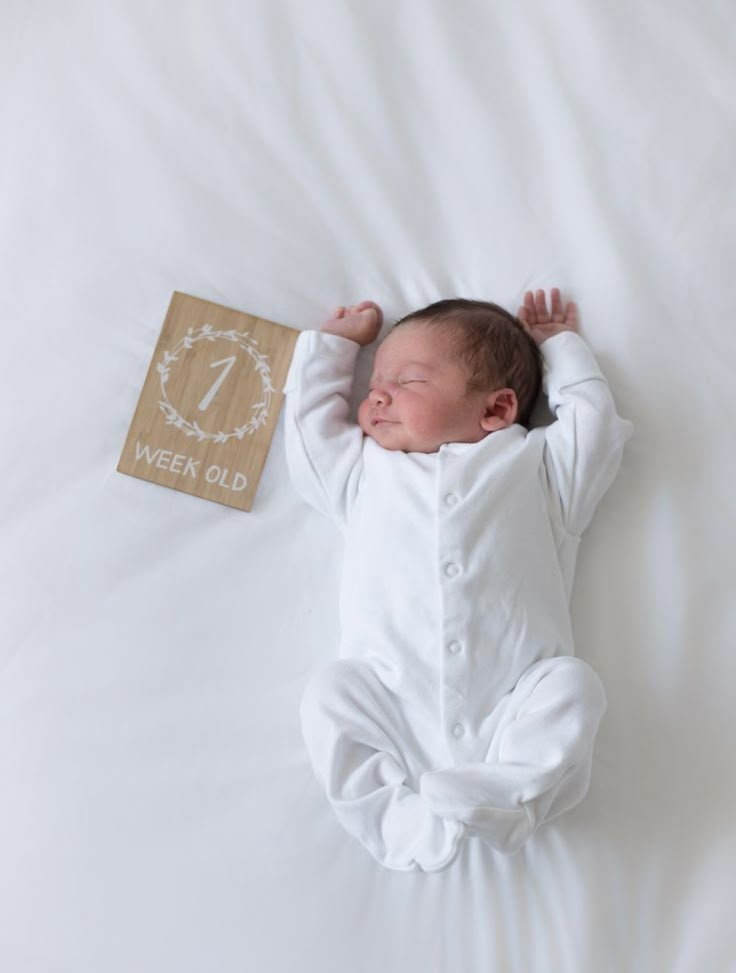 This means that hypothermia or overheating of the child can lead to unpleasant consequences. Therefore, parents should ensure that the following conditions are observed:
This means that hypothermia or overheating of the child can lead to unpleasant consequences. Therefore, parents should ensure that the following conditions are observed:
- the temperature in the child's room should be maintained within 18-22 °C, while the level of humidity should be controlled - neither excessive humidity nor dryness should be allowed;
- baby clothes should be made of natural fabrics that provide optimal skin ventilation, hygroscopicity and do not accumulate static electricity;
- a newborn should not be covered with a blanket or blanket during sleep - clothing appropriate for the room temperature is sufficient;
- should regularly ventilate the room in which the child is. It is best to carry out through ventilation while the baby is out for a walk. 15-20 minutes before he returns to his room, you need to stop airing so that the air has time to heat up to the desired temperature.
What to worry about
Regular visits to the local pediatrician and health visitor help parents get rid of a lot of worries and worries. Specialists will timely determine any violations of the child's condition, examining his reflexes, growth and weight gain, and other factors. But a doctor cannot always be around, so parents need to be able to navigate the main signs that should be a reason to contact a specialist:
Specialists will timely determine any violations of the child's condition, examining his reflexes, growth and weight gain, and other factors. But a doctor cannot always be around, so parents need to be able to navigate the main signs that should be a reason to contact a specialist:
- the child looks lethargic for several hours in a row, refuses to feed, his sleep is often interrupted;
- any change in skin color not associated with hypothermia or overheating;
- nasal breathing in a child is difficult, he tries to breathe through his mouth, or inhalation and exhalation are accompanied by unnatural noises - whistling, wheezing;
- hoarseness, barking cough;
- fever;
- persistent disturbance of the stool (constipation, diarrhea) or changes in the feces (stench, black or too light, almost white feces).
But the main rule when monitoring a child's health is the following: in case of any deviations or changes in the behavior of a newborn, you should consult a doctor, since the first month of a baby's life is a very crucial period, and it is extremely important not to miss the beginning of the development of any disease, which may affect the health and development of the child in the future.